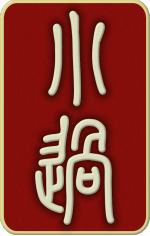
小过 Xiǎo guò Small surplus (Slight excess) [hexagram 62]


Thunder over Mountain
 Wood element
Wood element
Lunar month: 1 ; Host (controlling) line : 5
The Decision
Small Surplus – success as long as steadfast. Small affairs can be tackled but not great ones. The flying bird exemplifies the situation – descending is better than ascending. Very promising.
Small surplus, the small exceed and reach fulfillment. ‘Success as long as steadfast’ – act at the appropriate time. The weakness at the center suggests only small affairs prosper. The strength is not in the central or correct place and so avoid ‘great affairs’. ‘The flying bird exemplifies the situation – descending is better than ascending. Very promising’ – ascent is unfitting while descent is the natural course.
小过: 亨, 利贞, 可小事, 不可大事. 飞鸟遗之音, 不宜上, 宜下, 大吉. Xiǎo guò: hēng, lì zhēn, kě xiǎo shì, bù kě dà shì. fēi niǎo yí zhī yīn, bù yí shǎng, yí xià, dà jí.
彖传: 小过, 小者过而亨也. 过以利贞, 与时行也. 柔得中, 是以小事吉也. 刚失位而不中, 是以不可大事也. 有飞鸟之象焉, 有飞鸟遗之音, 不宜上宜下, 大吉; 上逆而下顺也. Tuàn zhuàn: Xiǎo guò, xiǎo zhě guò ér hēng yě. guò yǐ lì zhēn, yú shí háng yě. róu dé zhòng, shì yǐ xiǎo shì jí yě. gāng shī wèi ér bù zhōng, shì yǐ bù kě dà shì yě. yǒu fēi niǎo zhī xiàng yān, yǒu fēi niǎo yí zhī yīn, bù yí shǎng yí xià, dà jí; shǎng nì ér xià shùn yě.
The Image
Thunder over mountain forms ‘Small surplus’. The wise accordingly in conduct are dutifully humble, in mourning are exceedingly sorrowful and in expenditure are exceedingly frugal.
象传: 山上有雷, 小过; 君子以行过乎恭, 丧过乎哀, 用过乎俭. Xiàng zhuàn: Shān shàng yǒu léi, xiǎo guò; jūn zǐ yǐ háng guò hū gōng, sāng guò hū āi, yòng guò hū jiǎn.
Line Change 1
The bird flies its way to misfortune.
‘The bird flies its way to misfortune’ – nothing can be done to avoid this.
初六: 飞鸟以凶. Chū liù: fēi niǎo yǐ xiōng.
象传: 飞鸟以凶, 不可如何也. Xiàng zhuàn: Fēi niǎo yǐ xiōng, bù kě rú hé yě.
Line Change 2
Surpassing the grandfather and meeting the grandmother. No attempt to surpass the leader but willing to serve. No fault.
‘No attempt to surpass the leader’ – do not overstep due distance.
六二: 过其祖, 遇其妣; 不及其君, 遇其臣; 无咎. Liù èr: guò qí zǔ, yù qí bǐ; bù jí qí jūn, yù qí chén; wú jiù.
象传: 不及其君, 臣不可过也. Xiàng zhuàn: Bù jí qí jūn, chén bù kě guò yě.
Line Change 3
Neglecting precautions and consequently, subject to an assault. Misfortune.
‘Consequently, subject to an assault. Misfortune’ – a serious mistake.
九三: 弗过防之, 从或戕之, 凶. Jiǔ sān: fú guò fáng zhī, cóng huò qiāng zhī, xiōng.
象传: 从或戕之, 凶如何也. Xiàng zhuàn: Cóng huò qiāng zhī, xiōng rú hé yě.
Line Change 4
No fault but only equaling rather than exceeding expectations. Progress is dangerous, demanding caution. Unnecessary to always push forwards.
‘Only equalling rather than exceeding expectations’ – the position is inappropriate. ‘Progress is dangerous, demanding caution’ – the course should not be indefinitely pursued.
九四: 无咎, 弗过遇之. 往厉必戒, 勿用永贞. Jiǔ sì: wú jiù, fú guò yù zhī. wǎng lì bì jiè, wù yòng yǒng zhēn.
象传: 弗过遇之, 位不当也. 往厉必戒, 终不可长也. Xiàng zhuàn: Fú guò yù zhī, wèi bù dàng yě. wǎng lì bì jiè, zhōng bù kě cháng yě.
Line Change 5
Thick clouds but no rain from the west. The prince shoots an arrow and hits its target in the cave.
‘Thick clouds but no rain’ – the clouds are too high.
六五: 密云不雨, 自我西郊, 公弋取彼在穴. Liù wǔ: mì yún bù yǔ, zì wǒ xī jiāo, gōng yì qǔ bǐ zài xué.
象传: 密云不雨, 已上也. Xiàng zhuàn: Mì yún bù yǔ, yǐ shǎng yě.
Line Change 6
Rather than equaling the outcome it is surpassed. A bird flies too high. Misfortune. A case of calamity and self-injury.
‘Rather than equaling the outcome it is surpassed’ – too proud a position.
上六: 弗遇过之, 飞鸟离之, 凶, 是谓灾眚. Shǎng liù: fú yù guò zhī, fēi niǎo lí zhī, xiōng, shì wèi zāi shěng.
象传: 弗遇过之, 已亢也. Xiàng zhuàn: Fú yù guò zhī, yǐ kàng yě.
The full set of 64 English translations is available in our new book 'Book of Changes - Deciphered' ➚.